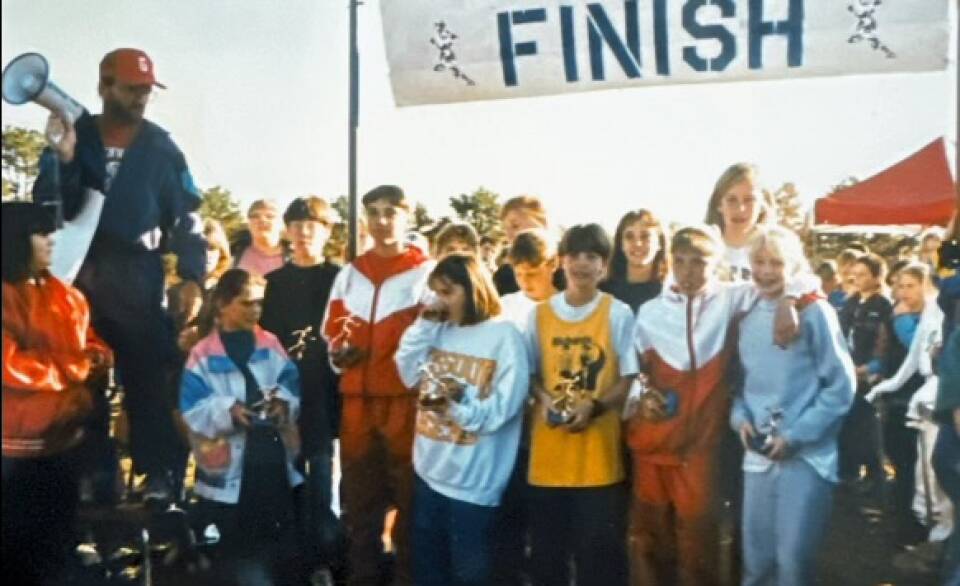When I was assigned to cover last year’s Boston Marathon, I was brand new in town. I had just moved here four months earlier from Missouri.
I got up before the sun and rode the Green Line to its Arlington stop, where I was met with a sea of school buses, sidewalk cafes setting out tables and people flocking toward Copley Square.
I showed my press credentials at the Fairmont Copley Plaza hotel, then set up my laptop and recording gear. Dozens of other journalists were already there, ready to watch the thrilling event on huge screens.
The spectacular Kenyan runner Eliud Kipchoge was expected to crush the men’s race. But that day, Kipchoge struggled, coming in sixth.
I could hear the roar of the crowd near the finish line outside the hotel.

The top three finishers in both the men’s and women’s races were escorted right past me in the Copley Plaza ballroom for a press conference, their golden laurels atop their heads.
Reporter after reporter asked each of these elite athletes how they had prepared to run against a field of world-renowned competitors. They all shared a similar sentiment, summed up simply by the third place women’s runner, Lonah Salpater: “I was running my own race.”
When I heard that phrase, “Run your own race,” I was instantly transported back in time to a childhood cross country meet in the rural Ozarks of southern Missouri.
I grew up on a farm, chasing tadpoles in the creek and chopping a hole in the ice for the cattle when the ponds froze over. Other than church and school, there weren’t a lot of places for us kids to hang out. But we had miles upon miles of roads for running, like the gravel lane once used by my great-great-grandparents’ horse and wagon, and the winding road that cuts behind our family cemetery through meadows of deep-green alfalfa and horses.
My rural, K-8 school was so small that many kids like me ended up playing every single sport, including cross country.
In my mind’s eye, I was pretty fast.
But my sister Lizzy could fly.
And in this particular race, held on a course of former farmland, she started out at the front. After about a mile in, she was feeling great.
But then she looked around and realized her usual pack of competitors was farther behind than usual. So she panicked, thinking she had started out too fast, and pulled way back on the throttle.
Then, a familiar voice resonated across the field: “Lizzy, don’t worry about them! You keep going! You gotta RUN YOUR OWN RACE!”

That voice belonged to our respected coach and teacher, Mr. Rodenbeck.
Lizzy heard him, kicked it back into high gear and won the race.
My two worlds, united by a phrase
For days after covering the Boston Marathon, I kept thinking about this phrase that connected those top runners in Boston, where I now live, to Mr. Rodenbeck, back in the Ozarks.
And I faintly recalled: hadn’t we heard rumors as kids that “Coach” had been a world champion of some sort of competition?
I decided to Google him. And imagine my surprise when I saw his name, Larry Rodenbeck, on the USA Track and Field Masters website along with his accolades, times and records.
It had been a quarter of a century since we’d last spoken.
I called him. And after talking about our families and life events, I asked him about the track and field rumors.

He told me that while he was a teacher and coach, he also drove across the country to compete in track and field. The Pentathlon. Long jump. Multiple races. Even javelin and discus.
And he was really, really good.
He even broke the indoor world record for his age group in the triple jump when he was in his 40s.
I asked him if he remembered Lizzy’s race.
“Lizzy did go out quick,” he said. “And she was looking back. And you can't start looking back. You've got to look ahead. And she kept going.”
Coach Rodenbeck will turn 75 in a few weeks. And then he’ll head to Sacramento, where he’ll compete for the national championship in triple jump again. He said he used to just look forward to the competitions, but over the years, gratitude has become even more prominent. Now, he says “running his own race” looks different than when he was in his 20s and 30s.

“As you age, you’re so thankful that you can still train and go to a competition. But it’s really the training, day after day, that you look forward to,” he said.
Of course, that phrase, “run your own race,” extends way beyond sports.
In an era where it feels like being compared to others is a constant battle, it’s important to know who you are and what you want — and focus on that.
Coach Rodenbeck said some people are both: fierce competitors, while also remaining true to themselves.
As I prepare to take in my second Boston Marathon as a journalist, I fully expect to be wowed by the winners, those boundary-pushing athletes and their marvelous mental and physical triumphs.
But I’ll also reserve wonder for the masses, for every competitor on a marvelous, singular race.
I’ll see you at the finish line.








